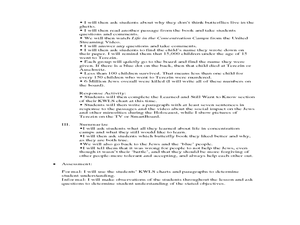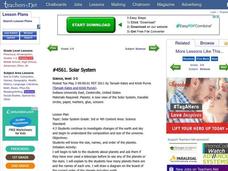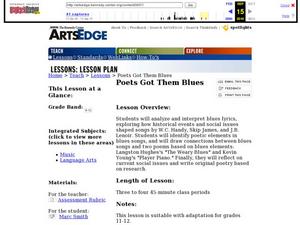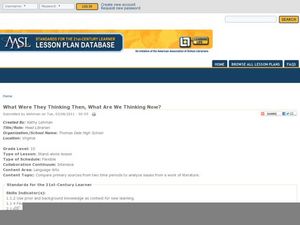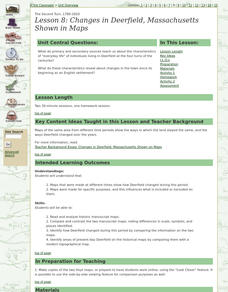Curated OER
Routing Explorers
Students read excerpts from an explorer's journal and then become investigators and navigators themselves. Students answer questions about the difficulties and time it took for the explorers to travel from Washington to New Orleans and...
Curated OER
Autobiography
Sixth graders read and write autobiographical sketches, determine the author's purpose in writing, and type paragraphs using WP utilities.
Curated OER
Ghana Artifacts
Students study to artifacts from Ghana and discuss how these aid in understanding the civilization.
Curated OER
What's Up with Waste?
Fifth graders design a brochure that identifies types of solid waste that are often improperly disposed, explains the effects of this disposal and proposes a solution to the problem. The read humorous books, define vocabulary words and...
Curated OER
What is an Explorer
Students become explorers. They examine a picture of an explorer and create props to explore within the classroom. Students are studying the Louisiana Purchase of 1803. They explore how to read a map and create a map of the classroom...
Curated OER
Hickory Dickory Dock Webquest
Students listen to and read nursery rhymes. They discuss rhyming words. Students play a variety of computer games with rhymes, numbers and telling time. They retell the story through dramatic play, speech, and comprehension questions.
Curated OER
Migration Isn't Just For The Birds
Fourth graders explore the concepts of conservation using a reading story that describes a flock of geese. The ecosystems are also described in the lesson and the effects of pollution.
Curated OER
Political and Social Impact of World War II
Sixth graders study the life in Jewish ghettos during World War II and learn about tolerance and compassion. For this WWII lesson, 6th graders discuss Jewish ghettos but with a mistreatment of the kids with stickers to signify the Jewish...
Curated OER
Solar System
Students study space. In this solar system lesson, students discover the correct order of the planets and create a diagram showing this knowledge. They listen to the book A New View of the Solar System and then work in groups on their...
Curated OER
Cargo Shipping
Pupils work effectively in groups to achieve a common goal: Create the most efficient cargo shipping route. They successfully identify and locate port cities using latitude and longitude. To use the formula r=d/t (rate equals distance...
New York State Education Department
TASC Transition Curriculum: Workshop 11
You'll C-E-R a difference in classroom achievement after using a helpful lesson. Designed for economics, civics, government, and US history classes, participants practice using the CER model to craft arguments about primary and secondary...
Curated OER
Energy
Scientific terms can be difficult to remember. This resource suggests developing analogies as a way to make energy terms memorable. After listing new terms on the board, groups develop analogies based on restaurant words, and then share...
Curated OER
Pharaoh Mountain Hike: Investigating Adirondack Life Zones
Students hike a local mountain and examine its life zones. They measure various components at each zone and collect leaf litter at the sites. At the mountain top, students make descriptive observations and complete a handout about the...
Curated OER
Wants and Needs
Here is an outstanding lesson on wants versus needs designed for 1st graders. Pupils listen to the book, Something Good which presents themes on wants, needs, choice, resources, and counting money. Pupils complete worksheets embedded in...
Curated OER
Poets Got Them Blues
Contemplate what music learners listen to and why they listen. Can they find poetry within music lyrics? Specifically hone in on blues lyrics and ruminate upon the social issues prevalent in the themes. Particular song lyrics coincide...
Curated OER
Rhythm and Improv, Jazz and Poetry
Connect the ideas of jazz improvisation and art to writing poetry. Learners collaborate and write different lines of poetry, imitating the jazz styles of improvisation and freewriting. Take a close look at the poems "Tenebrae" by Yusef...
Curated OER
Synonyms
Students discover the defintion for synonyms and how they describe similar situations. They start with a common word such as "happy" and brainstorm different words that mean the same as happy. They draw pictures or write sentences to...
Curated OER
Asking Research Questions
Using discoveries and inventions as the focus, learners complete a research project. First, they come up with research questions. Then, they conduct research on the topic. Finally, they write a research paper.
Curated OER
What Were They Thinking Then, What Are We Thinking Now?
Choosing an issue from a play or novel, researchers find two primary sources from different time periods to compare how people's views have changed. Many questions are listed to guide young writers. In the end, learners produce a...
Curated OER
Find Figurative Language
Meet with the school library specialist and work together to plan a visit and presentation on figurative language. After defining and examining examples of targeted terms, the class travels to the library where the SL has collected...
Curated OER
Poetry
Fourth graders participate in reading and listening to poetry. They are exposed to a variety of poems and examine and identify basic elements of poetry. They write their own poems and recite a poem with enthusiasm, expression, and props.
Curated OER
Aboriginal Physical Education
Students engage in p.e. activities that have roots in native Indian, Metis, and Inuit cultures. They practice the skill involved and listen to the significance behind the skill. They read relevant books and define new terminology.
Curated OER
Lesson 8: Changes in Deerfield, Massachusetts Shown in Maps
Eighth graders study maps of the same area from different time periods which show the ways in which the land stayed the same, and the ways this New England village changed over the years.
Curated OER
Teaching Imagery
Students review the terms idyll and imagery. They read "A Winter Idyll" from "Snowbound" as a class. They break into groups of 5 and respond/react to their lines to make connections to the text.









